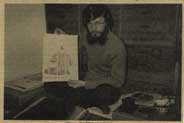Time Angle
(1994) Here's a ten-minute feature program, filmed during the days while I was preparing for the 'half-way' exhibition of the Hyakunin Isshu poetry series in January 1994. I was insanely busy just then, but they mostly didn't interfere with what I was doing, and just followed us around while we set up the show (I say 'us' because my parents came over for a visit just then). Includes a visit to Shimano-san the blockmaker, and a short sax 'concert' by my dad! (10 minutes ... about 17Mb)
TV Listings
The 'Woodblock Shimbun' has a full selection of TV programs on file. Videos available include some of David's news appearances, complete feature programs, and some short documentaries on his work. The files are in QuickTime format, and can be easily viewed with your browser.
Program listings are on the Index page ... ![]()
Traditional Craft, Crisis or ... ?
As a worker in the field of traditional Japanese crafts, one of the most common things I hear from visitors to my workshop is, "Isn't it a pity that wonderful crafts like this are dying out nowadays." We sometimes tend to view traditional crafts as being superior to modern ways of doing things, but I have to wonder about this. I am sure that the craftsmen of old did not view their work in special terms. I think that they were simply people 'doing a job'. (1994)
Full Story. ![]()
David Bull: Printmaker
The classic woodblock prints made famous by Hokusai and others depict a stylized, long-lost Japan. A chance encounter with woodblock printing at an exhibition in Toronto more than twenty years ago led David Bull down a path that has made him the only artist, Japanese or foreign, working to reproduce those classical prints. (2000)
Full Story. ![]()
Japan and Me
"In 1775 an Edo bookshop published a series of portraits of the Hyakunin Isshu poets with illustrations by Katsukawa Shunsho, who was the leading designer of his day, just before Utamaro. We do not know if the book sold well or not, but few copies have survived and the book is extremely rare." (1989)
Full Story. ![]()



